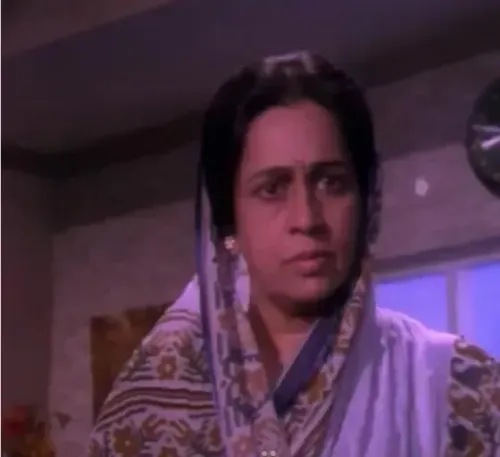The Moment Naushad Asserted Himself Against a Renowned Hindi Film Director
New Delhi, Dec 25 (NationPress) The singular composer for Hindi film legends from K. L. Saigal to Shah Rukh Khan, Naushad was adept at effortlessly intertwining the melodies of Indian classical music, the rhythms of folk music from different parts of the subcontinent, and the harmonies of Western classical music to captivate audiences. Yet, he had many other notable achievements throughout his career.
While he was still carving out his niche in the Bombay film industry, Naushad expertly managed to assert himself against a leading film director who attempted to meddle in his creative process.
Naushad (1919-2006), born in Lucknow on this very date (December 25), reminisced about the time he was recording the unforgettable melody 'Jawaan Hai Mohabbat' for 'Anmol Ghadi' (1946) -- a cherished piece from the era of undivided India. During this recording session, the formidable Mehboob Khan, the film's director, barged in and began directing the musicians and technicians on how to proceed. He even urged singer Noorjehan to modify certain notes. Naushad, however, responded with, "Everything will be executed precisely as you desire, Mehboob Sahab."
But the very next day, Naushad flipped the situation. Upon visiting the set, he learned they were shooting the song he had just recorded. Requesting the director's approval to observe through the camera, he began directing the crew to adjust props.
Annoyed, Mehboob Khan grabbed Naushad by the ear and exclaimed, "Hey you 'laatsahaab', who do you think you are? Get lost, this is not your area. Your role is in music direction, mine is in directing!"
Naushad calmly replied that this was the acknowledgment he had been anticipating, leading Mehboob Khan to understand and remain steadfast in his directorial role in the subsequent seven films they collaborated on.
Naushad also played a pivotal role in elevating Hindi film music by engaging acclaimed classical artists like Ustad Amir Khan, D. V. Paluskar, and Ustad Bade Ghulam Ali Khan to lend their voices.
His experience with Ustad Bade Ghulam Ali Khan for 'Mughal-e-Azam' is a fascinating story, influenced by the director K. Asif's habit of flicking ash off his cigarette and his sheer audacity, which ultimately sealed the agreement. Naushad shared this enthralling tale in his unique style during an interview with former Chief Election Commissioner S. Y. Quarishi, who was then the Director General of Doordarshan, in 2002.
However, his path to fame was not immediate; he arrived in Bombay as a teenager in 1937, working as an assistant to music directors like Ustad Jhande Khan and Khemchand Prakash before earning his first independent film in 1941. It was only with his 13th film 'Rattan' (1944) that he achieved significant success.
Yet, he couldn't fully enjoy this victory. The popular songs were frequently played at celebrations -- particularly at Naushad's own wedding -- but he felt no pride in them because it was a time when film careers were looked down upon, and he had to endure his (unaware) father and father-in-law disparaging those who pursued such professions. In fact, his family claimed he was merely working as a tailor in Bombay.
Throughout his career, which extended until the mid-21st century's first decade, Naushad composed music for fewer than 100 films, including masterpieces like 'Anmol Ghadi', 'Shahjehan', 'Andaz' (featuring Dilip Kumar, Raj Kapoor, and Nargis), 'Aan', 'Baiju Bawra', 'Mother India', 'Mughal-e-Azam', 'Kohinoor', 'Gunga-Jamuna', 'Ram Aur Shyam', 'Sunghursh', and ultimately, 'Taj Mahal: An Eternal Love Story' (2005), prioritizing quality over quantity.
He turned down numerous projects where the filmmakers demanded complete music scores within a month, insisting that he needed a month just to finalize a single tune!
While he formed a lasting partnership with lyricist Shakeel Badayuni—especially when Mohammad Rafi performed the resulting songs—Naushad, hailing from Lucknow, a hub of Urdu poetry, was himself a talented poet, composing everything from ghazals to nazms and geets, as well as tributes to his idols and contemporaries.
His poetry collection, 'Athvan Sur', includes several ghazals and nazms like 'Modern Music', which concludes with: "Sangeet hai ya koi kabarhi ki dukaan hai/Saazon ka faqt shor hai sangeet kahan hai/'Naushad' dua karta hai bas haath uthaye/Sangeet ki kashti ko khuda par lagaye."
One ghazal he frequently quoted begins, "Abhi saaz-e-dil mein taraane bahut hain/Abhi zindagi ke bahaane bahut hain", and then, likely referencing the traditional Indian essence in his music, states: "Dar-e-ghair par bheekh maango na fann ki/Jab apne hi ghar mein khazaane bahut hain", concluding with humor: "Hain din bad-mazaki ke 'Naushad' lekin/Abhi tere fann ke deewane bahut hain".
(Vikas Datta can be reached at vikas.d@ians.in)









